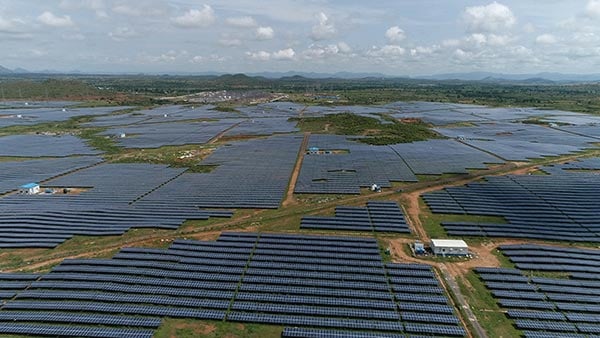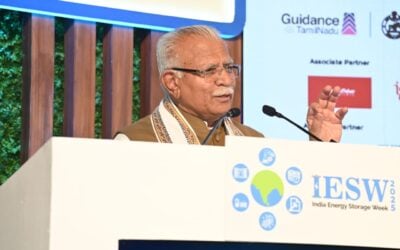
The automotive component manufacturing unit of India’s Tata Group has supplied battery energy storage system (BESS) units to an energy storage park under construction by Tata Power.
Tata AutoComp, launched in 1995 to make vehicle parts for manufacturers in India and abroad, has been making lithium-ion (Li-ion) battery storage equipment through a joint venture (JV) with Chinese battery manufacturer Gotion at a facility in Pune, Maharashtra.
Enjoy 12 months of exclusive analysis
- Regular insight and analysis of the industry’s biggest developments
- In-depth interviews with the industry’s leading figures
- Annual digital subscription to the PV Tech Power journal
- Discounts on Solar Media’s portfolio of events, in-person and virtual
Tata AutoComp’s vehicle customers include other Tata Group companies. Tata Power, the influential group’s integrated power company, has taken delivery of the first BESS units which will be installed at a new 120MW ‘Energy Storage Park’ in Chhattisgarh, Central India.
While an announcement made on Saturday (18 November) by Tata Power did not give any further details of the project, or what type of equipment is being provided, it did note that Tata Power Renewable Energy subsidiary Tata Power Solar Systems has entered a supply agreement with AutoComp for BESS to be used at renewable energy projects.
Tata AutoComp’s JV with Tier 1 EV and BESS battery manufacturer Gotion is called Tata AutoComp Gotion Green Energy Solutions.
The JV encompasses the design, manufacture, supply and servicing of Li-ion battery packs, including lithium iron phosphate (LFP), nickel cobalt manganese (NCM) and lithium titanium oxide (LTO) cell chemistries, in prismatic, cylindrical and pouch form factors.
The JV is also working on battery pack and system level technologies including battery management system (BMS) and power distribution units, and is targeting various EV market segments, as well as the stationary BESS market.
Tata AutoComp Gotion Green Energy Solutions has just inaugurated its BESS manufacturing facility in Pune which will have 6GWh annual production capacity when fully ramped up.
“Tata AutoComp has always been a pioneer in introducing cutting edge technology to its customers. We are leveraging our knowledge in the automotive domain to serve emerging markets which have a synergy in technology,” Tata AutoComp chairman Arvind Goel said.
“We have been pioneers in launching the Li-Ion based battery packs and BMS for the electric vehicle segment. We are now leveraging this knowledge to build battery energy storage systems.”
India’s support for its emerging BESS market
India is on a big national drive to create a market for energy storage, particularly in light of its major renewable energy deployment efforts that target 450GW of new solar PV and wind by 2030, as well as 50GW of other renewables.
Energy storage is a key part of integrating that new capacity on the country’s grid, as well as for increasing access to electricity for rural communities and enabling wider takeup of EVs. A National Electricity Plan published a couple of months ago put that need at 74GW/411GWh of storage by 2032, based on assessments by the Central Electricity Authority and expected to comprise roughly two-thirds BESS and one-third pumped hydro energy storage (PHES).
The union government in September approved a competitive tender scheme to support the construction of 4GWh of standalone BESS projects around the country by 2031, while various state entities including the Solar Energy Corporation of India (SECI) have launched around 9GW of tenders for ‘firm renewables’ aka renewables-plus-storage so far during 2023.
The changing market dynamics have led to the likes of General Electric (GE) to open facilities for manufacturing key energy storage equipment such as power conversion system (PCS) inverters in India through GE Renewable Energy, while BESS system integrator Fluence has opened a technology centre there. The government is also seeking to support domestic manufacturing of battery cells, through a production linked incentive (PLI) programme for advanced chemistry battery cells.
“With the rise of renewables, energy storage has become critical to address the intermittency of solar and wind energy resources. We shall integrate these BESS at our renewable sites to enable round-the-clock supply of clean power and ensure a speedier green energy transition,” Tata Power CEO and MD Praveer Sinha said last week.
Tata AutoComp’s JV partner Gotion meanwhile is reportedly looking to establish 100GWh of annual battery production capacity in international markets outside its home base in China. That includes a US$2 billion gigafactory in Illinois, US, announced in September, and a cooperation agreement to target the large-scale BESS market in Japan with an initial 1GWh annual sales target.
Late last year another Gotion JV broke ground on Vietnam’s first-ever LFP gigafactory, while the company is also planning EV and BESS battery pack and module production facilities in Thailand.






